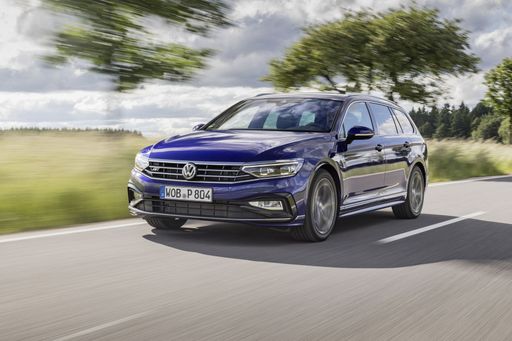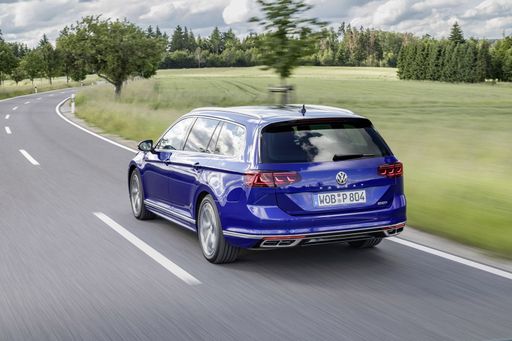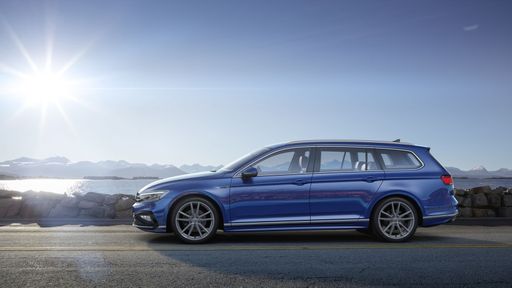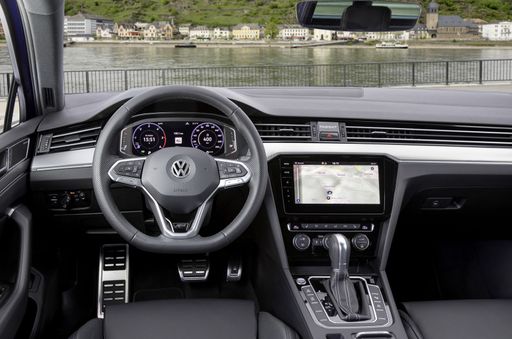Hyundai Bayon vs VW Passat – Differences & prices compared
Compare performance, boot space, consumption and price in one view.
Find out now: which car is the better choice for you – Hyundai Bayon or VW Passat?
The Hyundai Bayon (SUV) comes with a Petrol engine and Manuel or Automatic transmission. In comparison, the VW Passat (Estate) features a Plugin Hybrid, Diesel or Petrol engine with Automatic transmission.
When it comes to boot capacity, the Hyundai Bayon offers 411 L, while the VW Passat provides 690 L – depending on how much space you need. If you’re looking for more power, decide whether the 100 HP of the Hyundai Bayon or the 272 HP of the VW Passat suits your needs better.
In terms of consumption, the values are 5.40 L per 100 km for the Hyundai Bayon, and 0.40 L for the VW Passat.
Price-wise, the Hyundai Bayon starts at 20100 £, while the VW Passat is available from 37300 £. Compare all the details and find out which model fits your lifestyle best!
Hyundai Bayon
The Hyundai Bayon is a compact crossover that effortlessly merges practicality with modern design. Its sleek exterior and spacious interior make it an ideal choice for urban settings and longer journeys alike. With a focus on comfort and connectivity, this vehicle provides a smooth driving experience paired with advanced technology features.
details @ hyundai.news
@ hyundai.news
 @ hyundai.news
@ hyundai.news
 @ hyundai.news
@ hyundai.news
 @ hyundai.news
@ hyundai.news
 @ hyundai.news
@ hyundai.news
VW Passat
The VW Passat is a staple in the family saloon segment, known for its refined design and practicality. It effortlessly combines a comfortable ride with a spacious interior, making it a popular choice for long journeys. The cabin features high-quality materials and an intuitive infotainment system, providing a premium feel without sacrificing user-friendliness.
details @ volkswagen-newsroom.com
@ volkswagen-newsroom.com
 @ volkswagen-newsroom.com
@ volkswagen-newsroom.com
 @ volkswagen-newsroom.com
@ volkswagen-newsroom.com
 @ volkswagen-newsroom.com
@ volkswagen-newsroom.com

|

|
|
|
|
Costs and Consumption |
|
|---|---|
|
Price
20100 - 25800 £
|
Price
37300 - 57200 £
|
|
Consumption L/100km
5.4 - 5.5 L
|
Consumption L/100km
0.4 - 8.1 L
|
|
Consumption kWh/100km
-
|
Consumption kWh/100km
-
|
|
Electric Range
-
|
Electric Range
124 - 133 km
|
|
Battery Capacity
-
|
Battery Capacity
19.70 kWh
|
|
co2
124 g/km
|
co2
8 - 183 g/km
|
|
Fuel tank capacity
40 L
|
Fuel tank capacity
45 - 66 L
|
Dimensions and Body |
|
|---|---|
|
Body Type
SUV
|
Body Type
Estate
|
|
Seats
5
|
Seats
5
|
|
Doors
5
|
Doors
5
|
|
Curb weight
1170 - 1195 kg
|
Curb weight
1673 - 1858 kg
|
|
Trunk capacity
411 L
|
Trunk capacity
510 - 690 L
|
|
Length
4180 mm
|
Length
4917 mm
|
|
Width
1775 mm
|
Width
1849 mm
|
|
Height
1500 mm
|
Height
1521 mm
|
|
Payload
460 - 465 kg
|
Payload
501 - 577 kg
|
Engine and Performance |
|
|---|---|
|
Engine Type
Petrol
|
Engine Type
Plugin Hybrid, Diesel, Petrol
|
|
Transmission
Manuel, Automatic
|
Transmission
Automatic
|
|
Transmission Detail
Manual Gearbox, Dual-Clutch Automatic
|
Transmission Detail
Dual-Clutch Automatic
|
|
Drive Type
Front-Wheel Drive
|
Drive Type
Front-Wheel Drive, All-Wheel Drive
|
|
Power HP
100 HP
|
Power HP
122 - 272 HP
|
|
Acceleration 0-100km/h
11.3 - 12.4 s
|
Acceleration 0-100km/h
5.8 - 10.7 s
|
|
Max Speed
176 - 179 km/h
|
Max Speed
212 - 250 km/h
|
|
Torque
172 - 200 Nm
|
Torque
320 - 400 Nm
|
|
Number of Cylinders
3
|
Number of Cylinders
4
|
|
Power kW
74 kW
|
Power kW
90 - 200 kW
|
|
Engine capacity
998 cm3
|
Engine capacity
1498 - 1984 cm3
|
General |
|
|---|---|
|
Model Year
2024
|
Model Year
2024
|
|
CO2 Efficiency Class
D
|
CO2 Efficiency Class
B, D, G
|
|
Brand
Hyundai
|
Brand
VW
|
Hyundai Bayon
Introducing the Hyundai Bayon: A New Era in Compact SUVs
The Hyundai Bayon, a compact SUV designed with urban adventurers in mind, is making waves with its exceptional blend of style, performance, and technology. The brand has pulled out all the stops to ensure that the Bayon stands out in the crowded SUV market, offering a vehicle that is both practical and innovative.
Sleek Design and Cutting-Edge Aerodynamics
The Bayon features a striking exterior design, characterised by its bold lines and angular shapes. With a length of 4180 mm, a width of 1775 mm, and a height of 1500 mm, the Bayon commands attention with its modern appeal and aerodynamic efficiency. These dimensions not only contribute to its sleek design but also enhance fuel efficiency, achieving an impressive 5.4 L/100 km.
Engine Performance and Specifications
Under the bonnet, the Bayon is powered by a 1.0-litre T-GDI petrol engine, delivering a robust 100 PS or 74 kW. This engine is available with either a manual or automatic gearbox, meeting varied driver preferences. The front-wheel-drive system complements its urban-centric design, ensuring a smooth and responsive ride.
Maximised Interior Space and Comfort
The spacious interior of the Bayon accommodates up to five passengers comfortably. The vehicle boasts a boot space of 411 litres, perfect for both everyday use and weekend getaways. The cabin is designed with practicality and technology in mind, with intuitive controls and ample storage options.
Advanced Technology and Connectivity
Hyundai has equipped the Bayon with state-of-the-art technology to enhance the driving experience. The SUV features a high-resolution touchscreen, offering seamless connectivity with Apple CarPlay and Android Auto. Safety is also a priority, with multiple driver assistance systems including lane-keeping assist and forward collision avoidance assist.
Environmental Efficiency
Despite its powerful performance, the Bayon achieves a respectable CO2 efficiency class of D, with emissions as low as 122 g/km. This balance between performance and environmental responsibility makes the Bayon an attractive option for conscientious drivers.
Affordability and Market Appeal
The Hyundai Bayon is competitively priced, ranging from €22,900 to €29,600. Its affordable running costs, estimated at 32.3 to 36.4 cents per kilometre, further enhance its appeal to budget-conscious consumers. With monthly costs ranging from €806 to €909, the Bayon provides excellent value without compromising on features or performance.
Final Thoughts
The Hyundai Bayon truly stands out in the compact SUV segment, combining style, innovation, and practicality in an appealing package. It offers a versatile driving experience suited to the demands of modern urban living, making it a top contender in its class. As Hyundai continues to champion forward-thinking design and technology, the Bayon is a testament to the company's ongoing commitment to excellence.
VW Passat
The Evolution of the VW Passat: A Blend of Tradition and Innovation
The VW Passat has long been a staple in the realm of family cars, known for its reliability, spaciousness, and impressive engineering. The latest models uphold this reputation while integrating cutting-edge technology, making them some of the most competitive offerings in the market today.
Engine Options and Performance
The modern VW Passat embraces a wide array of powertrains to cater to different driving preferences. From the nimble 1.5 eTSI ACT petrol-powered mild hybrid with 150 PS to the robust 2.0 TSI petrol variant with 265 PS, there's an engine configuration for every type of driver. For those conscious of fuel efficiency, the plug-in hybrid models offer an impressive consumption rate of just 0.4 L/100 km, with an all-electric range of up to 126 km, providing an eco-friendly solution without compromising performance.
Advanced Transmission and Drive Systems
Every Passat features a sophisticated automatic dual-clutch gearbox, ensuring smooth transitions and optimal fuel efficiency. The drive options include both front-wheel and all-wheel-drive systems, which provide better traction and handling in various driving conditions. The all-wheel-drive system, particularly in the high-performance variants delivering up to 272 PS, ensures superior control and stability even in challenging terrains.
Interior Comfort and Connectivity
The interior of the VW Passat is designed with a focus on luxury and technological convenience. With a wide array of premium materials and ergonomic design, the cabin offers an inviting atmosphere for both driver and passengers. Advanced connectivity features keep you linked to the digital world, with a user-friendly infotainment system that integrates seamlessly with smart devices, ensuring entertainment and convenience on every journey.
Innovative Safety Features
Safety is a key consideration in the design of the VW Passat. The latest models come equipped with an array of state-of-the-art safety features, including adaptive cruise control, lane-keeping assist, and an emergency braking system. These technologies work together to provide a safe and secure driving experience, reflecting Volkswagen's commitment to driver and passenger safety.
Fuel Efficiency and Environmental Impact
The VW Passat stands out in its segment with noteworthy fuel efficiency across the board. With CO2 emissions ranging from just 8 g/km in hybrid models to a maximum of 183 g/km, the Passat offers a broad spectrum of environmentally conscious driving options. This impressive efficiency is complemented by a range of CO2 efficiency classes spanning from B to G, catering to varying environmental preferences.
Conclusion: A Versatile Family Car
In conclusion, the VW Passat remains a remarkable choice for families and individuals seeking a blend of performance, comfort, and advanced technology. Its wide range of options and configurations allow it to meet diverse needs, ensuring that there's a Passat for everyone. With prices ranging from €41,665 to €66,695, the Passat offers premium value in its class, further solidifying its reputation as a definitive all-rounder in the world of estate cars.
The prices and data displayed are estimates based on German list prices and may vary by country. This information is not legally binding.
